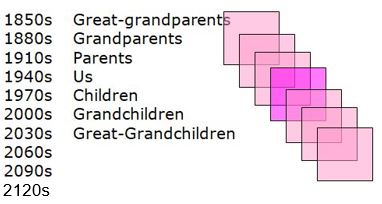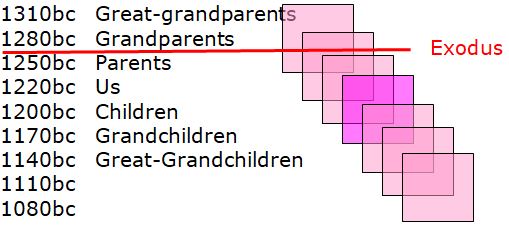Let’s recap on what we read in our last study.
Look at Judges 2:7 and 10.
7 The people served the Lord throughout the lifetime of Joshua and of the elders who outlived him and who had seen all the great things the Lord had done for Israel.
10 After that whole generation had been gathered to their ancestors, another generation grew up who knew neither the Lord nor what he had done for Israel.
Were any of the people who had made those promises still alive?
Lets look at the timescale of the these events and personalize it a bit.
Do you remember your Grandparents? Do you remember any stories they told you from their life? When and where they were born?
Mine were born in the 1880s and roughly since then the generations have followed at about 30 year intervals. (You will probably want to adjust the years to fit your own age!)

How real are the events of our parents’ life?
We actually experienced some of the events from our parents’ life, even if we were too young to realise it at the time. For me an example would be the war. I know that the things my parents did were true, but they actually told me very little about it, and I know even less about their earlier life.
How real are the events of our grandparents’ life?
I was close enough to my grandmother to accept the stories she told me, and to imagine her and her brothers and sisters acting them out. She had the time to talk to me most. I would spend hours listening to her stories and she was only too happy to have someone to talk to.
But what about stories relating to great grandparents? Do they fit better in the realm of myths?
I know that some of the things I heard really happened, but I doubt others. Too many embellishments have been added to the stories over the years.
Let’s now imagine ourselves as Israelites. The exodus happened ten years before our parents were born. We were born just about the time our family entered the promised land.
Assuming the date of the Exodus was 1260bc (Lots of discussion on this!)
And that each generation starts after 30 years.

When we left Egypt our grandparents were 20.
Remember it was only those people who were under 20 when they left Egypt, and their children and possibly grandchildren, who entered the Promised Land.
Our parents were born during the ‘wanderings in the wilderness’.
What was the maximum age of everyone (Except Joshua and Caleb) when we entered the Promised Land? 40.
Our Grandparents had died before the end of the wandering period – maybe before we were being born – any way we have no personal memories of them at all.
We only know life in Canaan. Our parents have told us a bit about a life in Egypt that their parents had told them. But they were tales of long ago and far away – a bit mythical. They have described the desert wanderings to us and how God fought for them against the Amorites as they entered Canaan. And how he destroyed the walls of Jericho. They have also brought us up to worship the household gods (Gen 31v19,34,35) . Ancestral gods, Terah’s gods, Pharaoh’s gods and Israel’s God.
We are middle-aged now. We too have seen national service and so have our children. But our experiences of war don’t tie up with the stories our parents told us. Their experiences of God don’t fit our world. The God who helped them into the Promised Land seems to be weaker now we’re actually here, with many of the battles we fight going against us.
Also the God who provided basic rations for 40 years seems to be less powerful than the Baals of Canaan who provide such a plentiful crop each year. So it seems right to at least join in their harvest festivals and other ceremonies from time to time and include their gods with ours.
The priests moved the Tabernacle of God from Gilgal to Shiloh so that it would be more secure, and convenient to everyone who wanted to go to the festivals there – but why would you want to?
And another thing. All these wars. Why can’t we learn to accept people of other nationalities and live harmoniously with them? Surely this country is big enough without having to keep attacking those of a different ethnic background? Our own neighbours are Canaanites and they are lovely people.
Let’s look at Judges 2:6-15 again.
6 After Joshua had dismissed the Israelites, they went to take possession of the land, each to his own inheritance. 7 NOTE: The people served the LORD throughout the lifetime of Joshua and of the elders who outlived him and who had seen all the great things the LORD had done for Israel.
8 Joshua son of Nun, the servant of the LORD, died at the age of a hundred and ten. (That makes him old enough to be a great-grandfather!) 9 And they buried him in the land of his inheritance, at Timnath Heres in the hill country of Ephraim, north of Mount Gaash.
10 After that whole generation had been gathered to their ancestors, another generation grew up who knew neither the Lord nor what he had done for Israel. 11 Then the Israelites did evil in the eyes of the Lord and served the Baals. 12 They forsook the Lord, the God of their ancestors, who had brought them out of Egypt. They followed and worshipped various gods of the peoples around them. They aroused the Lord’s anger 13 because they forsook him and served Baal and the Ashtoreths. 14 In his anger against Israel the Lord gave them into the hands of raiders who plundered them. He sold them into the hands of their enemies all around, whom they were no longer able to resist. 15 Whenever Israel went out to fight, the hand of the Lord was against them to defeat them, just as he had sworn to them. They were in great distress.
But no-one can say they weren’t warned. Both through Moses and Joshua the Lord had given them explicit prophetic warnings – and they were carelessly ignored.
After Joshua and the Elders had died, how long did it take for the nation to loose even an outward obedience to God?
Judges 2:10-11.
10 After that whole generation had been gathered to their fathers, another generation grew up, who knew neither the LORD nor what he had done for Israel.11 Then the Israelites did evil in the eyes of the LORD and served the Baals.
How long? One generation.
Is there any parallel with church-going England during our generation?
Only those with a personal experience of God will want to follow him.
If you asked the man in the street what sin is, what would be his response?
But what is the sin which distresses God most?
Turning our back on him and worshipping other ‘gods’.
I’m afraid that the book of Judges will make depressing reading. Look again at Joshua 24:16-18 and 21-22.
16 Then the people answered, ‘Far be it from us to forsake the Lord to serve other gods! 17 It was the Lord our God himself who brought us and our parents up out of Egypt, from that land of slavery, and performed those great signs before our eyes. He protected us on our entire journey and among all the nations through which we travelled. 18 And the Lord drove out before us all the nations, including the Amorites, who lived in the land. We too will serve the Lord, because he is our God.
21 But the people said to Joshua, ‘No! We will serve the Lord.
22 Then Joshua said, ‘You are witnesses against yourselves that you have chosen to serve the Lord.
‘Yes, we are witnesses,’ they replied.
What was the spiritual state of the nation under Joshua? How committed did they seem to be?
Now read verse 23.
23 ‘Now then,’ said Joshua, ‘throw away the foreign gods that are among you and yield your hearts to the Lord, the God of Israel.
Even then, they worshipped God and something else.
What does Isaiah 48:11 say? I will not yield my glory to another.
THERE IS ONE GOD.
GOD IS HOLY.
GOD REQUIRES OUR RECOGNITION AND WORSHIP.
Has anything changed over the centuries? Is God still the one true God? Is God still holy? Does God still require our worship? Does disobedience still bring defeat?
We compared our generations to those of Joshua’s.
What will our next generation be like?
What can we do about it?
The people who abandoned God had no grandparents to tell them the truth about God – they had all died in the wilderness.
Who then will tell the next generation?
We’ve seen that grandparents probably have a greater impact than parents – but from the chart we can also see that it was the grandparents who died in the wilderness. No-one over 59 was allowed into the promised land.
In Joshua’s closing days, the people pronounced ‘we will serve the Lord’.
Can we make decisions for those who are to follow?
Can we at least set examples?
Shouldn’t we always tell our testimonies of what the Lord has done, and will do?
Do we have grandchildren who are likely to go astray if we don’t tell them of what the Lord has done for us?
Perhaps to tell what the Lord has done for us is the greatest legacy we can leave.



